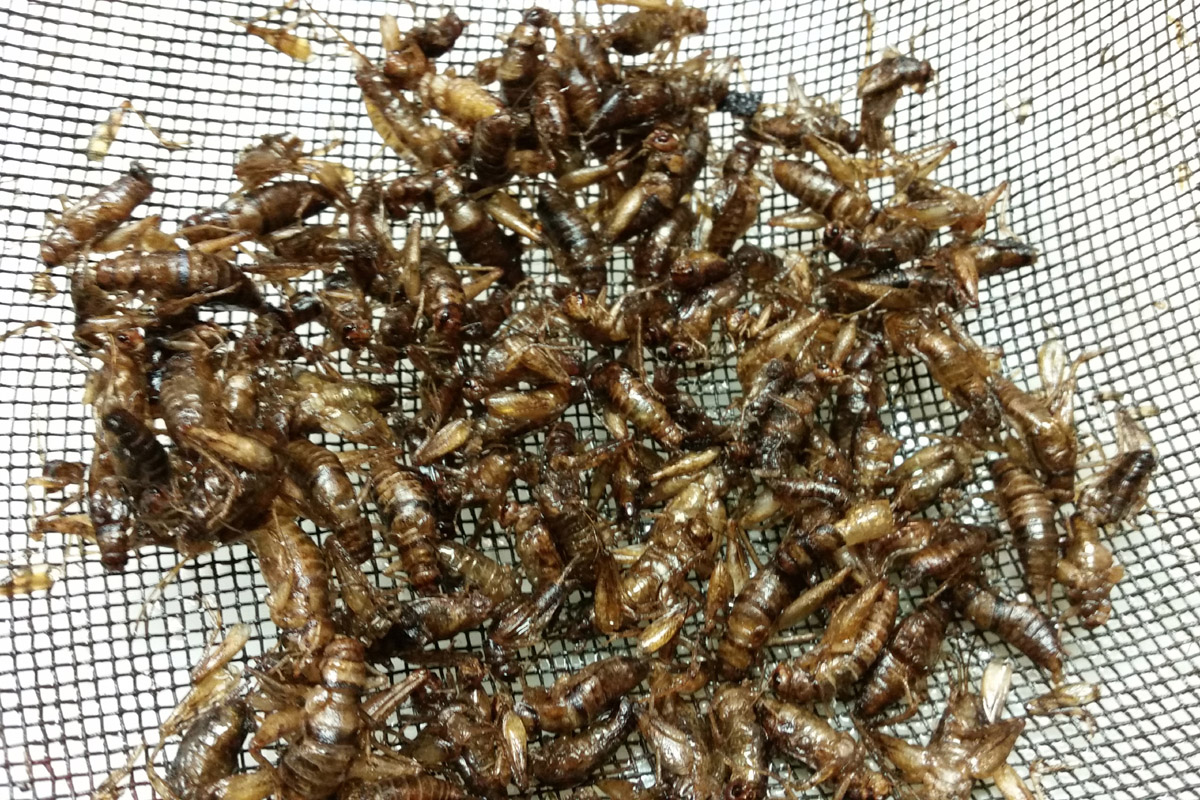At an artsy hipster bar in downtown Youngstown, Ohio—and yes, there is an artsy hipster bar in Youngstown—they serve gourmet hot dogs with 50 different kinds of toppings.
The golden pickled beets and root beer BBQ sauce are definitely among the most unique. But if you really want to get adventurous, you’ll go for the deep-fried crickets.
“We go through quite a bit of them. More than you’d think actually,” says the cook at Suzie’s Dogs and Drafts, tossing a batch into the deep frier.
They get the crickets from a farm just a mile down the road. It’s owned by Kevin Bachhuber and his partner, who left their jobs in software and finance in California to start the farm. Why Youngstown? It had cheap space to rent and plenty of water.
LISTEN: “The Case for Eating Insects”
But Bachhuber’s farm doesn’t look like any farm you’ve probably ever seen. Big Cricket Farms is basically a warehouse.
“The whole thing with indoor agriculture is that you’re moving away from the traditional sprawling farms into something that’s much more condensed,” Bachhuber says.
In the section of the warehouse where they raise and breed the crickets, there are eight bins—each about the size of a large bathtub. Half of them are low to the ground with the others lofted above like bunk beds. In each bin, there are stacks and stacks of cardboard—like egg cartons, but bigger—layered with peat moss. And the crickets are everywhere—hopping around on the cardboard and trays piled with cricket food.
“They eat anything, they’re consummate omnivores,” Bachhuber says.
The organic mash that he’s serving them is made of the same grains found in pig or chicken feed. And the peat moss—that’s vital for breeding.
“If you look, right here, this is a lady cricket,” Bachhuber says, pointing out a cricket with a long stinger-like structure extending from its back. “That’s an ovipositor. She’ll use that to deposit her eggs into a moist, dirtlike substrate. So that’s the peat moss stuff.”

You want crickets with that? At Suzie’s Dogs and Drafts in Youngstown, Ohio you can get hot dogs with more than 50 different toppings—including deep-fried crickets. Photo: Julie Grant
The farm only breeds a small percentage of their crickets because each female cricket can lay more than a thousand eggs per season. Crickets are fast growers too and can be ready for harvest in just six to eight weeks.
Bachhuber says they try to use every part of the cricket. A worker at the farm sifts out the legs, which are sold to a local fish farmer. And they also separate the insect waste, which is full of nitrogen and phosphorous, and sell it to be mixed with compost.
“The farmers and the composters—they freakin’ love it.”
The cleaned crickets go out to customers like Suzie’s Dogs and Drafts. Some of the bugs even make it into cricket flour, which is used in things like protein bars.
There’s even such a thing as “ gourmet” crickets. Bachhuber’s partner, Jaci Ampulski, says they tinker with the taste by feeding the crickets basil from another nearby farm.
“They got to eat it for about seven days, and when we harvested them, they tasted like basil,” Ampulski says. “We did it with mint too, and those turned out fantastic. It’s like ‘hint-of-mint’ cricket.”

It’s not super fancy, but crickets don’t need much high-tech gadgetry to do their thing. Some bathtub-sized bins, cardboard, peat moss and food is about all Kevin Bachhuber needs to keep his cricket population happy. Photo: Julie Grant
Bachhuber got the idea to raise crickets in 2006. He was drinking beer and watching bad TV in a Thailand bar when someone put out a basket of fried crickets. He loved them.
Then in 2013, he saw the United Nations report pushing crickets and other insects as an environmentally friendly protein. The UN Food and Agriculture Organization found that edible insects contain high-quality protein, vitamins and amino acids. Insects also need six times less feed than cattle—and half the feed required by pigs and broiler chickens—to produce the same amount of protein. Insects also emit fewer greenhouse gases.
The report got Bachhuber to look more seriously at the cricket industry, which ultimately led him to his life as a cricket farmer. But that’s not the reason he got into it.
“The sustainability thing is great. But I got into this because of taste. I like having a wide palate. I like the taste of bugs. I like eating them.”
And the taste? The crickets are salty and crunchy, with a unique meaty texture. It might take a little getting used to. But Bachhuber says with orders on the rise, he expects we’ll get more chances to try them.
###
In Pittsburgh, you can find Bachhuber’s crickets at Strip District Meats.


